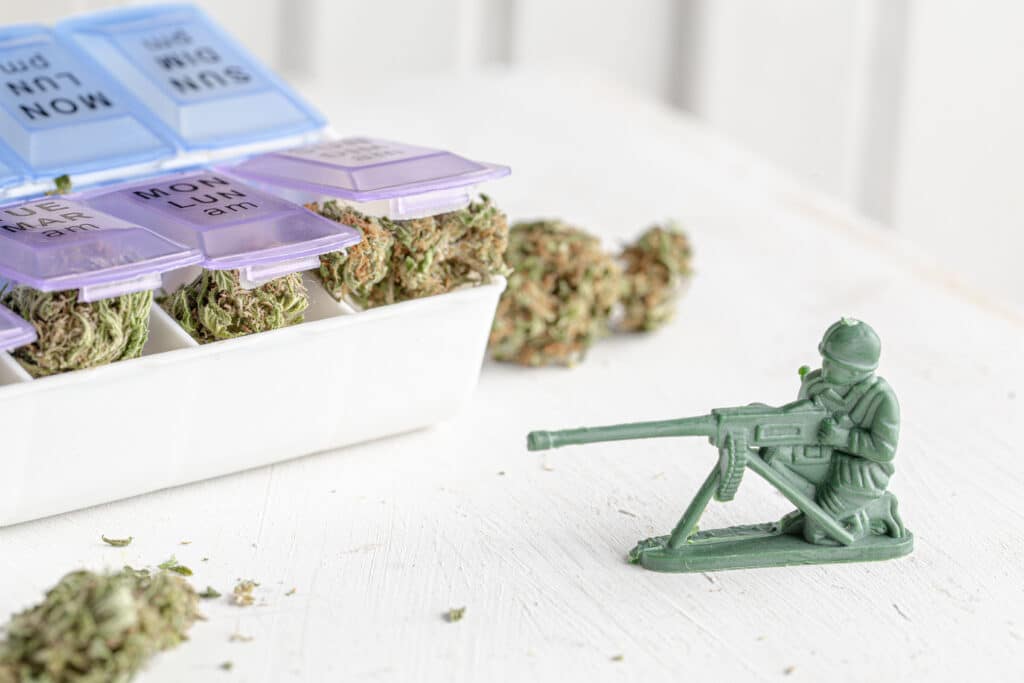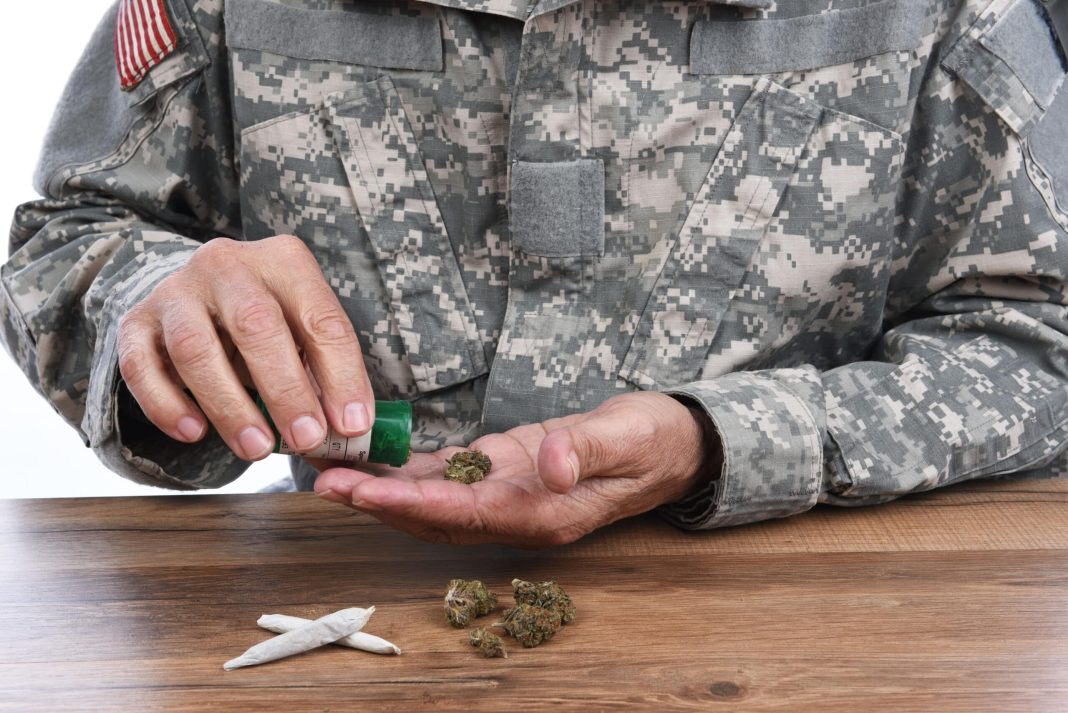The US government might say cannabis is a Schedule I drug, but that doesn’t mean the whole government agrees. Not only is the DEA getting sued by a former employee over CBD use, but now a series of new introduced amendments could usher in an age of cannabis reform in the military; including the end to testing. Here’s the lowdown.
New amendments for military cannabis reform
On June 30th, Matt Gaetz of Florida introduced a possible amendment to the National Defense Authorization Act. This Act covers annul budget and spending for the US’s Department of Defense. The bill is one of a few which seeks to reform cannabis policy in the military.
The amendment, should it pass, would update the NDAA to end cannabis testing for military personnel, both at the time of enlistment, and when accepting a commission. Positive tests have become a growing problem in the military, particularly in legal states. As per a New York Times article, via High Times, between 2020 and 2022, the percentage of recruits with positive tests, jumped 33%.
Said Gaets in a statement, via High Times, “Our military is facing a recruitment and retainment crisis unlike any other time in American history. I do not believe that prior use of cannabis should exclude Americans from enlisting in the armed forces. We should embrace them for stepping up to serve our country.”
This particular amendment covers not caring if a new recruit gets high sometimes. There are a couple other pieces of legislation, also currently moving through congressional circuits, that could institute other aspects of military cannabis reform. One amendment was offered by Representative Brian Mast of Florida. This amendment focuses on allowing VA doctors in legal states to give their opinions and recommendations to veterans on cannabis based medicines. It doesn’t come with the ability to prescribe these medications though.
However, there is another amendment that does just about the same thing, which recently passed The Senate Appropriations Committee. This bill, sponsored by Senator Jeff Merkley of Oregon, is a part of a greater spending bill. Should it pass, it would do the same as the previously mentioned amendment, in that VA doctors could now recommend cannabis medicines to military members.
A fourth amendment out there is more focused on CBD in particular. Proposed by Representative Tony Gonzalez of Texas, this amendment would bar the Secretary of Defense from banning military members from having or using hemp or hemp-derived products. It stipulates that this is only the case in places where possession and use of these substances already complies with federal, state, and other local laws.
This inserts some confusion into it, as the federal government hasn’t approved any hemp or hemp-derived products for consumption yet, outside of pharmaceutical medications. It’s quite possible that Gonzalez wrote the bill in anticipation of an upcoming change in federal policy.
How the military deals with cannabis use increase
These amendments are to catch up to changing times. But this means that the military is already encountering a lot of increased cannabis use; otherwise, we probably wouldn’t hear about it at all. For a body like the military, this creates a conundrum. It wants to follow federal policy as a federal body; but it also doesn’t want to lose possible recruits because of a failed drug test.
According to the High Times article, May reports state that the US military instituted a grace period for 3,400 recruits in just the past five years; all of whom failed a cannabis test. This allowed the prospective soldiers to wait a period of time, and then try again. It also said that between 2018-2022, 3,300 drug test-failing recruits (or those who admitted use), had their negative cannabis behavior waived by the Army specifically.

Different military branches operate differently. The Army is often a little more relaxed than other branches like the Navy. The Navy operates closer to a zero-tolerance policy when it comes to failing a drug test. To give another example of the changing times, even the Navy is letting up a bit. More recently the Navy acted like the Army, giving a grace period of 90 days to failed test-takers. This is also true now of the Air Force and Marines.
This is all a major downgrade from how cannabis use is generally treated in the military. All active duty workers can be arrested under federal law. Any service member on federal duty, is automatically beholden to Article 112a of the Uniform Code of Military Justice. It comes with specified maximum penalties for cannabis possession. Over 30 grams means dishonorable discharge, forfeiting pay and allowance, and five years in confinement. Under 30 grams is the same, except the period of confinement is two years.
If a military worker is charged with possession with intent to distribute, cultivation, or importing or exporting the weed; they’re looking at all the same, except up to 15 years in confinement. Confinement in the military is similar to prison, but not in a regular prison system. It can mean military prison, jail, or in the person’s private quarters (although the latter is less likely for a long term confinement, and more probable for a pretrial confinement, or confinement of a short period).
Military and cannabis – some history
The military has been going out of its way to be more lenient with cannabis users; as its alternative is for less people to enlist. In a volunteer army, too many stipulations that take out good prospects, is undesirable. This is reflected in entities like the Navy becoming more flexible with those who fail cannabis tests.
Cannabis is 100% prohibited in the US military, but it wasn’t always this way. In WWI, for example, doctors recommended American Expeditionary Forces to bring along cannabis indica tablets to help with the likes of insomnia, headaches, and cramps. A report from 1933 by the U.S. Army Medical Corps, called Marijuana Smoking in Panama, reported that cannabis wasn’t really addictive, and way less dangerous than alcohol. It did say cannabis should be banned on military bases, but didn’t think there should be other restrictions.
Cannabis use (and drug use in general) increased greatly among military personnel during the Vietnam war. In 1971, President Nixon directed military drug testers to identify those returning from Vietnam, who needed rehabilitation services. An amnesty program through the Department of Defense turned up 16,000 military members who claimed a drug problem. It’s probably good to note, that in these investigations, it was found that 42% of those who fought in Vietnam in 1971, tried opiates/opioids at least once.

In 1981, the Deputy Secretary of Defense authorized the arms of the armed services to take punitive action against those who tested positive for drugs. Drugs tested included: marijuana, cocaine, opiates, amphetamines, barbiturates, methaqualone, and PCP. This meant court marshaling (military court), or dismissal for a positive test.
In a showing that the US military already has made oversteps in this department, in 1983, a commission reviewed the testing procedures of the Army and Air Force specifically; and found non-working systems. In fact, over 10,000 military workers who were dismissed for illegal drugs; were offered compensation for their treatment, including a return to work.
Two years after this, the military changed its THC cutoff point for a positive THC test, to make the tests harder to pass. It brought down the limit from 75 ng/mL to 20 ng/mL for 9-tetrahydrocannabinol-9-carboxylic acid. This was lowered again in 1986 to 15 ng/mL. In 1992 the limit for cannabinoids in general was lowered to 50 ng/mL from 100 ng/mL.
In 1986, President Reagan made Executive Order 12564, which requires drug testing for all federal civilians, whether on or off duty. Congress passed it as Public Law 100-71 in 1987, and it still holds today. Another current amendment in the realm of government cannabis reform, filed recently by Representative Robert Garcia of California; wouldn’t get rid of this, but would ensure that those with failed cannabis tests, can still gain security clearances for federal jobs.
Conclusion
We see it in a lot of places; even the world of professional sports has lessened the testing and penalties for cannabis. Now, the military must consider these cannabis reform actions as well. Or if it doesn’t, watch its pool of possibilities, grow gradually smaller.
Welcome cannabis fans! Thanks for making your way to Cannadelics.com; an independent rag geared toward cannabis, hallucinogens, and the drug world at large. Come by frequently for updates. And sign up to the Cannadelics Weekly Newsletter, so you’re always first to know what’s going on.





